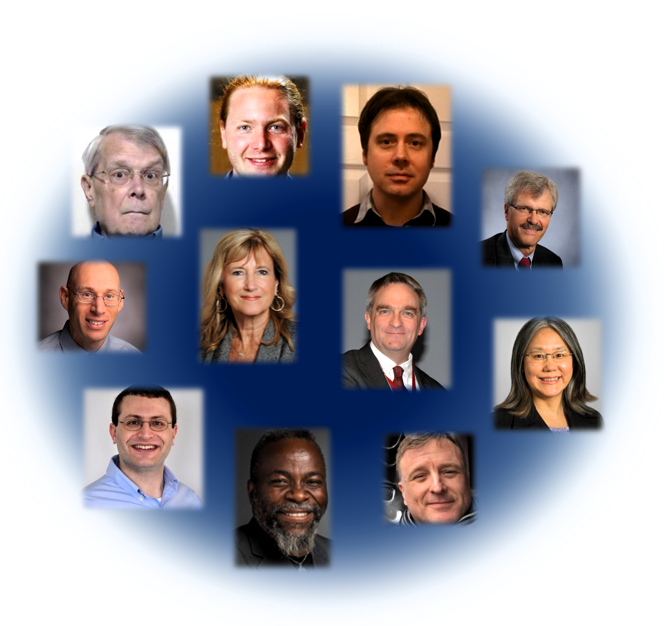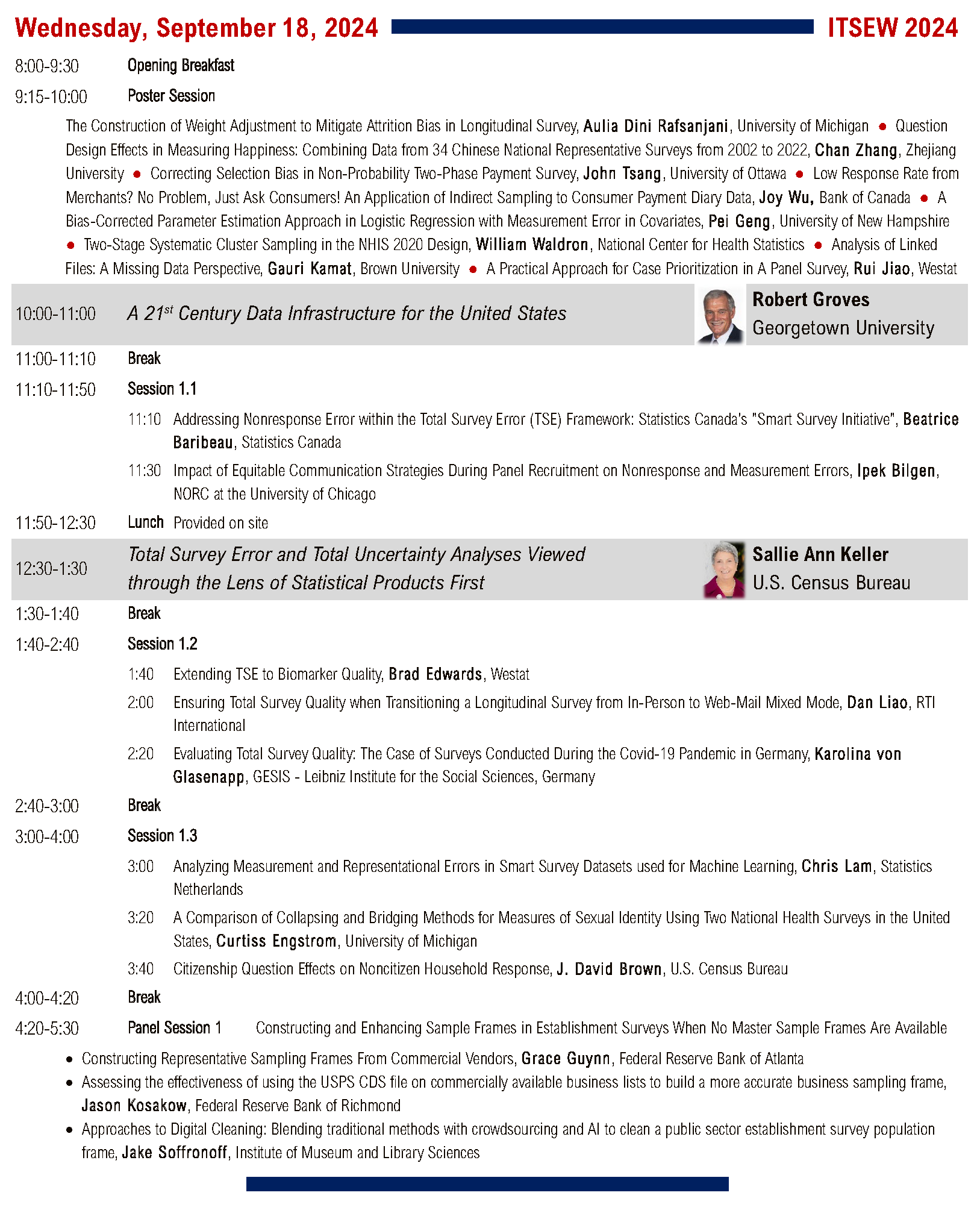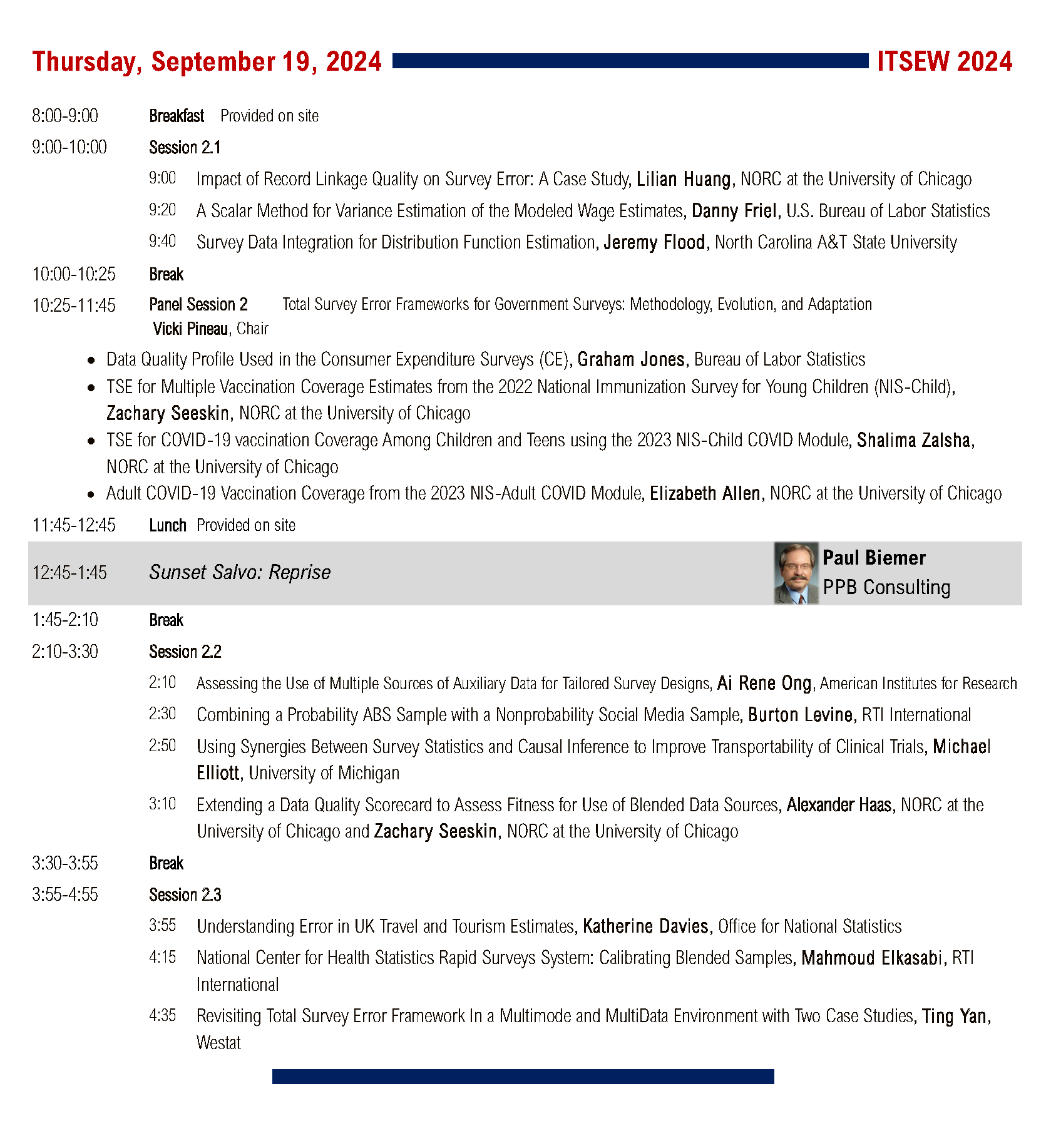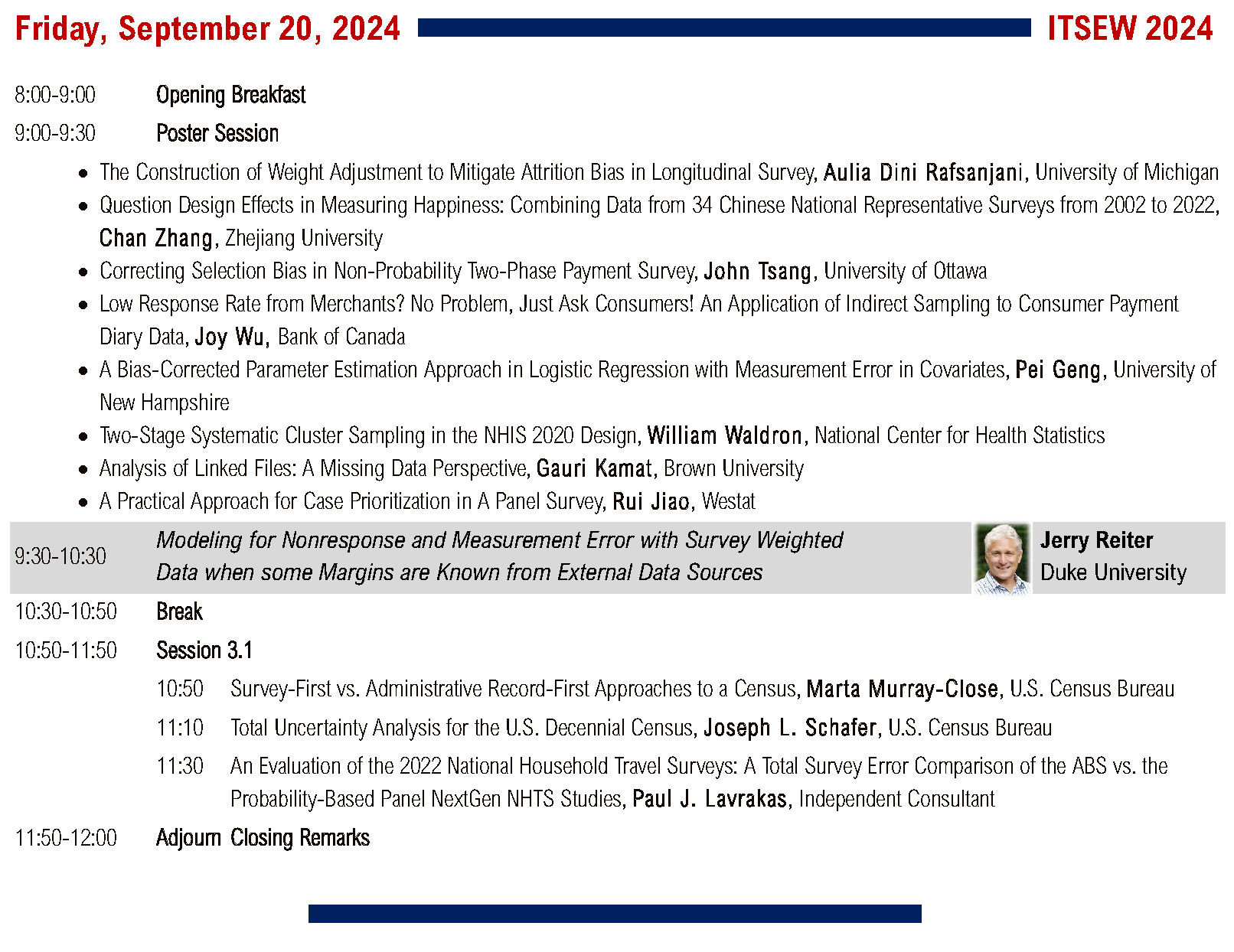Understanding Error in a Blended World
The goal of ITSEW is to promote discussion of questions of research, methodology and practice relating to Total Survey Error (TSE) and Total Survey Quality, and Blended Data. Workshop sessions are comprised of relatively short presentations and catalyzing discussion by a designated discussant. These presentations are followed by floor discussion among all participants.
Abstract/poster/panel submission deadline has passed. If you have questions, please email officeadmin@niss.org.
Plenary Speakers:
CONFERENCE INFORMATION:
- Register Now! (opens a new tab with EventBrite)
- $275 Students & NISS Affiliates Registration (email officeadmin@niss.org for promo code)
- $425 after August 15, 2024 Registration
- Nearby Hotels
- Travel Information
- EVENT FLIER: ITSEW2024
- RESTAURANTS NEARBY & Recommendations (Reservations are Highly recommended. Also, as you go down list, the restaurants get further away from Lehman Auditorium, 800 22nd Street, NW)
PLENARY SPEAKERS:
Robert M. Groves, Georgetown University, Provost
Robert M. Groves has served in this position since 2012, where he is also the Gerard J. Campbell, S.J. Professor in the math and statistics department as well as the sociology department. Groves is a social statistician who studies the impact of social cognitive and behavioral influences on the quality of statistical information. His research has focused on the impact of mode of data collection on responses in sample surveys, the social and political influences on survey participation, the use of adaptive research designs to improve the cost and error properties of statistics, and public concerns about privacy affecting attitudes toward statistical agencies.
Prior to joining Georgetown, from 2009-2012, he was director of the U.S. Census Bureau (presidential appointment with Senate confirmation), a position he assumed after being director of the University of Michigan Survey Research Center, professor of sociology, and research professor at the Joint Program in Survey Methodology at the University of Maryland.
He has authored or co-authored seven books and scores of peer-reviewed articles. His 1989 book, Survey Errors and Survey Costs, was named one of the 50 most influential books in survey research by the American Association of Public Opinion Research. Some of his other books were given national awards. He is an elected member of the US National Academy of Sciences and of the US National Academy of Medicine. He is an elected member of the American Academy of Arts and Sciences, an elected fellow of the American Statistical Association, and an elected member of the International Statistical Institute. Groves is the chair of the Board of Directors of the Pew Research Center. Groves has a bachelor’s degree from Dartmouth College and master’s degrees in statistics and sociology from the University of Michigan. He also earned his doctorate at Michigan.
Jerry Reiter, Duke University, Department Chair and Professor of Statistical Science
Dr. Reiter graduated from Duke University with a BS in mathematics in 1992. After working for two years as an actuary, he received his Ph.D. in statistics from Harvard University in 1999. He landed back at Duke in the Department of Statistical Science in Fall 2002. Between 2010 and 2015, he was the Mrs. Alexander Hehmeyer Professor of Statistical Science, having been appointed as a Bass Chair in recognition of "excellence in undergraduate teaching and research." His was the recipient of the Alumni Distinguished Undergraduate Teaching Award for 2007. This annual award is given by Duke undergraduates to a member of the Duke faculty. He was also honored as the recipient of the Outstanding Postdoc Mentor award for 2016 and the inaugural Distinguished Faculty Award for the Duke Master's in Interdisciplinary Data Science program in 2020.
He participates in both applied and methodological research in statistical science. Reiter is most interested in applications involving social science and public policy, although he enjoys working with researchers in all disciplines. His methodological research focuses mainly on statistical methods for protecting data confidentiality, for handling missing data, for combining information from multiple data sources, and for modeling complex data including methods for causal inferences. In 2015, The Atlantic published a story about his research on methods for protecting data confidentiality. He was the Principal Investigator of the Triangle Census Research Network, a research center funded by the National Science Foundation to improve the practice of data dissemination among federal statistical agencies. Until July 2019, he was the Deputy Director of the Information Initiative at Duke, an institute dedicated to research and applications in the analysis of large-scale (and not large-scale) data. He was appointed the Chair of the Department of Statistical Science in 2019. He stepped down from that position for the 2022/2023 academic year to serve as the interim Dean of Natural Sciences and returned to complete his term in 2023.
Sallie Ann Keller, US Census Bureau, Associate Director for Research and Methodology and Chief Scientist
Dr. Sallie Ann Keller is chief scientist and associate director of the U.S. Census Bureau’s Research and Methodology Directorate. She also holds an endowed distinguished professorship in biocomplexity and faculty appointments in the School of Medicine, Department of Public Health Services; School of Engineering and Applied Science, Department of Engineering Systems and Environment; and School of Data Science at the University of Virginia (UVA).
As chief scientist, Keller will lead the Research and Methodology Directorate’s research centers, each devoted to domains of investigation important to the future of social and economic statistics. The directorate collaborates with teams across the U.S. Census Bureau and with researchers around the country and the world to develop innovative scientific solutions and advances to ensure the Census Bureau remains a leader in economic and social measurement.
Keller is a nationally recognized research scientist whose areas of expertise are social and decision informatics, statistical underpinnings of data science, and data access and confidentiality. She is a leading voice in creating the science of all data and advancing this research across disciplines to benefit society.
Her prior positions include director of the Social and Decision Analytics Division within UVA’s Biocomplexity Institute and Initiative; professor of statistics and director of the Social and Decision Analytics Laboratory within the Biocomplexity Institute of Virginia Tech; academic vice president and provost at University of Waterloo; director of the Institute for Defense Analyses Science and Technology Policy Institute; the William and Stephanie Sick Dean of Engineering at Rice University; head of the Statistical Sciences group at Los Alamos National Laboratory; professor of statistics at Kansas State University; and Statistics Program director at the National Science Foundation.
Keller is an elected member of the U.S. National Academy of Engineering. She has served as a member of the National Academy of Sciences Board on Mathematical Sciences and Their Applications and the Committee on National Statistics, and as chair of the Committee on Applied and Theoretical Statistics. She is a fellow of the American Association for the Advancement of Science, an elected member of the International Statistics Institute, and a fellow and past president of the American Statistical Association. Keller earned her B.S. and M.S. in mathematics from the University of South Florida and her Ph.D. in statistics from Iowa State University.
Paul Biemer, PPB Consulting (RTI International, ret.)
Paul Biemer is Distinguished Fellow of Statistics (Emeritus) at RTI International and former Associate Director of Survey Research and Development for the Odum Institute at the University of North Carolina in Chapel Hill. During his 45+ year career, Biemer has examined the relationships between survey design and survey error and has developed statistical methods for evaluating survey errors, particularly nonsampling errors.
Biemer co-developed Adaptive Total Design (ATD) system of total survey error and costs minimization; the ASPIRE system for survey monitoring and quality improvement for official statistics; Audio Computer Assisted Self-Interviewing (ACASI) and Computer Audio Recorded Interviewing (CARI) which records interview-respondent interactions during CAPI interviews. He pioneered the field of latent class analysis for survey and census error evaluation. His book, Introduction to Survey Quality (with Lars Lyberg) was a widely-used course text back in the day. His book, Latent Class Analysis of Survey Error, describes how latent class analysis can be applied to complex surveys, including panel surveys, to evaluate survey error. Biemer also edited a number of book volumes including: Measurement Errors in Surveys, Survey Measurement and Process Quality, Telephone Survey Methodology and most recently, Total Error in Practice, all published by John Wiley & Sons. In 2005, he founded the annual workshop series – the International Total Survey Error Workshops (ITSEW) which continues today.
Biemer is a Fellow of the ASA and the AAAS and an Elected Member of the ISI, he holds a number of awards for his contributions to the fields of statistics and survey methodology, including the W.S. Connor Award, H.O. Hartley Award, the Morris Hansen Award and the Roger Herriot Award, AAPOR . He has and continues to consult extensively on the quality of official statistics with world governments including the Census Bureau, Statistics Sweden, Statistics Canada, Australian Bureau of Statistics, Statistics New Zealand, IAB (Germany), Central Bureau of Statistics (The Netherlands), and the Office for National Statistics in the UK.

Organizing / Planning Committee
- Alan Karr, Temple University
- David Matteson, NISS/Cornell University
- Ernest Fokoue, Rochester Institute of Technology
- James Rosenberger, Penn State University (ret.)
- John Eltinge, Bureau of Labor Statistics
- Jonathan Mendelson, Bureau of Labor Statistics
- Joshua Landon, George Washington University
- Marcus Berzofsky, RTI International
- Randy Freret, NISS
- Ting Yan, Westat
- Vicki Pineau, NORC at the University of Chicago

Agenda
Event Type
- NISS Hosted



